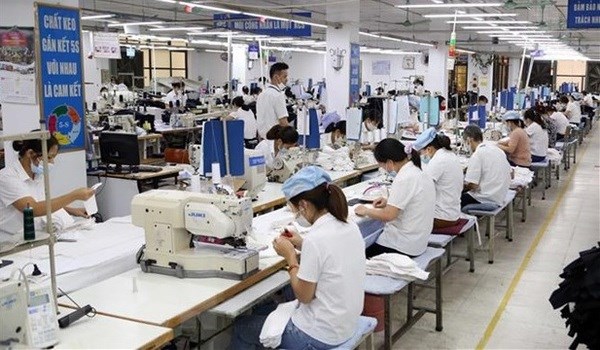HCM City's labour market flexibly adapts to pandemic
The COVID-19 pandemic has seriously affected all aspects of social life, causing difficulties for businesses and employees, forcing them to flexibly adapt to and integrate in the "new normal". Thus, Ho Chi Minh City is implementing many solutions to promote production, and socio-economic development, in which enterprises play a key role.
The COVID-19 pandemic has seriously affected all aspects of social life, causing difficulties for businesses and employees, forcing them to flexibly adapt to and integrate in the "new normal". Thus, Ho Chi Minh City is implementing many solutions to promote production, and socio-economic development, in which enterprises play a key role.
According to the Ho Chi Minh City Centre for Human Resources Forecasting and Labor Market Information (FALMI), in 2022, the city's labour market will develop towards gradually increasing the proportion of workers in the industrial-construction and service sectors while reducing those engaged in agriculture, forestry and fishery.
It is expected that the city will have more than 4.9 million workers, mainly in the trade-service, industry-construction sectors. Of these, the number of workers at enterprises is estimated at 3.1 million.
Do Thanh Van, Deputy Director of FALMI, said the recruitment demand in the city is forecast to reach 255,000-280,000 in 2022. The labour demand might increase to 280,000-310,000 if the situation develops in a positive direction.
Dr Tran My Minh Chau from the Economy and Environment Partnership for Southeast Asia (EEPSEA) under the University of Economics Ho Chi Minh City, said that there will be changes in the employment in HCM City as well as neighboring provinces in the near future in comparison to the period before the fourth wave of COVID-19 infections.
Three groups of industries, namely the manufacturing and processing industry, finance and banking, insurance and technology development, can recover very quickly because they are less affected by the pandemic.
The industries that will get better very fast are education, healthcare, family services, real estate, and construction. The industries that will see slow recovery are wholesale, retail, automobile and motorbike repair, transportation, warehousing, accommodation and catering services.
According to a representative of the International Labour Organisation in Vietnam (ILO), the prospect of job recovery is a challenge not only in HCM city and Vietnam but also in many countries around the world. Therefore, attention should be paid to developing policies, training programmes, and investment in the field of job training.
It is essential to push up opportunities for workers based on local economic advantages, improve workers' capacity to adapt to the fourth industrial revolution, the representative said.
The first phase of an economic recovery and development programme which focuses on overcoming the consequences and disruption of production and supply chains is underway in HCM City. The programme also supports enterprises that have been temporarily suspending operations to re-enter the market, restore production and business, create jobs, take care of social security and cultural activities on the basis of safe adaptation and effective control of the COVID-19 pandemic./.









